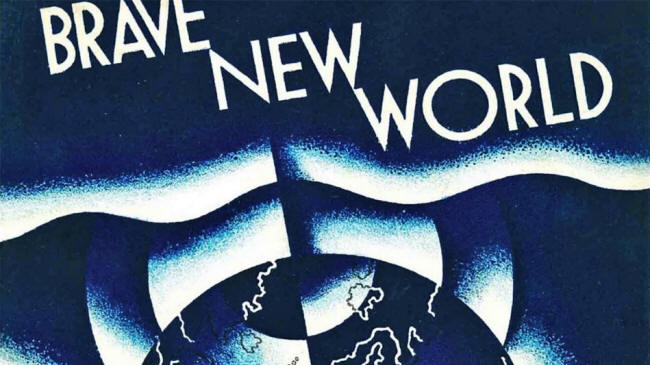|

by Scotty Hendricks
13 October,
2018
from
BigThink Website

His book
warns us of the dangers of
mass media,
passivity, and how even
an intelligent
population can be driven
to gladly choose
dictatorship
over freedom...
-
This 1931 novel predicted modern life almost to
a (model) T.
-
While other dystopias get more press, Brave New
World offers us a nightmare world that we've
moved steadily towards over the last century.
-
Author Aldous Huxley's ideas on a light handed
totalitarian dictatorship stand in marked
contrast to the popular image of a dictatorship
that relies on force.
When most people think of
what dystopia our society is sprinting towards, they tend to think
of 1984, The Handmaid's Tale, or the Hunger Games.
These top selling, well
known, and well-written titles are excellent warnings of worlds that
could come to pass that we would all do well to read.
However, one lesser-known dystopian novel has done a much better job
at predicting the future than these three books.
Brave New World, written in 1931 by
author, psychonaut, and philosopher Aldous Huxley, is well
known but hasn't quite had the pop-culture breakthrough that the
other three did.
This is regrettable, as it offers us a detailed image of a dystopia
that our society is not only moving towards but would be happy to
have.
Good Ford...!

Henry
Ford With His Model T
(Getty
Images)
In the novel, Ford
is worshiped as a god for his use of the assembly line in a way that
is frighteningly similar to how we swoon over tech gurus in Silicon
Valley.
For those who haven't read it, Brave New World is the
description of a nightmare society where everybody is perfectly
happy all the time.
This is assured through,
-
Destroying the
free will of most of the population using genetic
engineering and
Pavlovian conditioning,
keeping everybody entertained continuously with endless
distractions, and offering a plentiful supply of the wonder
drug Soma to keep people happy if all else fails.
-
The world state
is a dictatorship which strives to assure order.
-
The dictatorship
is managed by ten oligarchs who rely on an extensive
bureaucracy to keep the world running.
-
The typical
person is conditioned to love their subservience and either
be proud of the vital work they do or be relieved that they
don't have to worry about the problems of the world.
-
Global stability
is ensured through the Fordist religion, which is
based on the teachings of Henry Ford and Sigmund
Freud and involves the worship of both men.
-
The tenets of
this faith encourage,
The assembly line
is praised as though it were a gift from God.
Huxley's dystopia is
especially terrifying in that the enslaved population
absolutely loves their slavery...
Even the characters who
are smart enough to know what is going on (and why they should be
concerned) are instead content with everything that is happening.
Perhaps more terrifying
than other dystopian novels, in Brave New World there is
truly no hope for change.
The similarities between the world of today and the world of the
book are many, even if our technology hasn't quite caught up yet...
|



